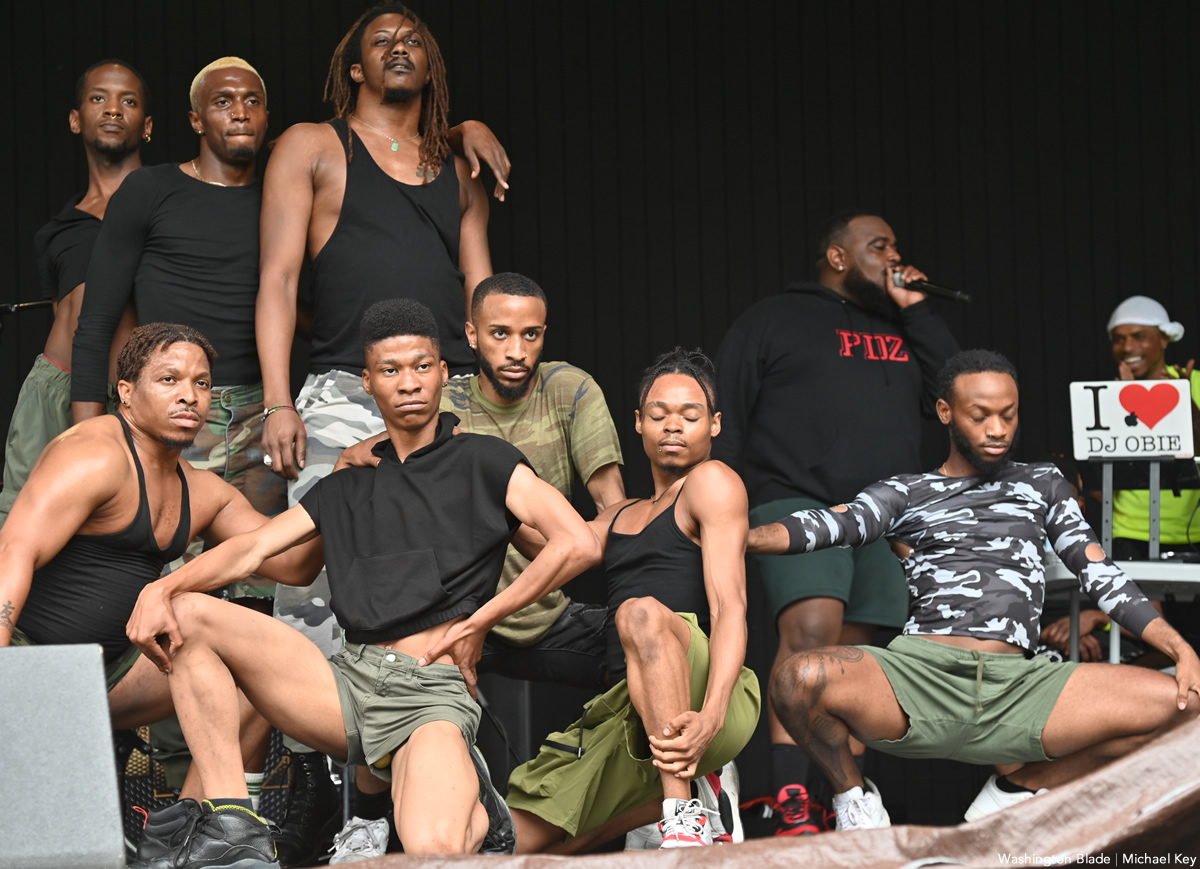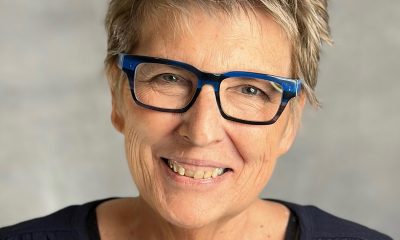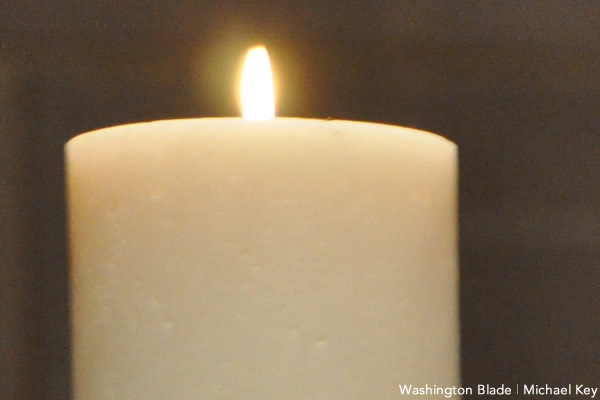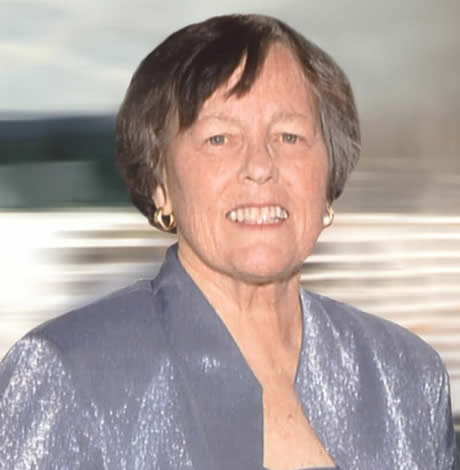Local
Obituaries
Dori Ann Steele, 53, Michael Baker, 64, and Everett Waldo, 77
Dori Ann Steele, 53
Dori Anne Steele, an author and massage therapist in Silver Spring, Md., died March 4 following a four-year struggle with a debilitating spinal nerve condition known as arachnoiditis. She was 53.
Her partner, University of Maryland Family Studies Professor Robyn Zeiger, said Steele took her own life when the pain from the incurable illness, which eventually would lead to partial paralysis, became unbearable.
Zeiger, who was Steele’s partner for more than 26 years, said she and the couple’s friends and family members remember Steele as a “healer” through her expertise as a certified massage therapist.
Friends and family members will celebrate Steele’s life at a memorial service scheduled for May 23 at the University of Maryland’s Memorial Chapel, Zeiger said.
Steele began her career as a Silver Spring massage therapist in 1994 after graduating from the Potomac Massage Training Institute of D.C. with a certification in Swedish and deep tissue massage. An Institute biography says she obtained advanced, post-graduate training in specialized massage techniques.
It also says that in 1999, she became a Reiki Master, a term used to describe people trained to perform and teach a Japanese technique for stress reduction and relaxation through massage and meditation.
Zeiger, who wed Steele in Canada in 2006 and again in California in 2008, said that prior to working as a massage therapist, Steele worked as an editor and technical writer for consulting firms that specialized in the fields of health and science. She received a bachelor’s degree in English and creative writing from Goddard College in Vermont.
Steele was a creative writer and poet, Zeiger said. Her book, “Drawing Back the Curtains: A Collection of Lesbian Erotica,” was published in 1990.
Zeiger, a licensed clinical counselor and senior lecturer at the University of Maryland, said Steele joined her in advocating for same-sex partner rights and benefits at the university and elsewhere. In 2007, the two focused on a campaign to persuade the University of Maryland to adopt such benefits.
“She went from a very vibrant, very alive person to another person due to the pain,” said Zeiger.
Zeiger told the Blade that Steele drove to a rustic location on Damascus Road in Gaithersburg where Steele and Zeiger enjoyed the scenery together in past years. Steele parked the car in a church lot and consumed a large quantity of pain medication, Zeiger said.
A Montgomery County medical examiner determined the death was caused by an overdose of oxycodone and alcohol.
“Dori made a rational and brave decision to end her life, given the dire circumstances of her severely painful physical condition,” Zeiger told the Gazette, a Maryland newspaper. “It was based not on depression, but on the fact that she could no longer tolerate the pain.”
The Gazette reported that in a note she left, Steele wrote, “I just cannot see any more doctors, have any more procedures, MRIs, pills.”
In addition to Zeiger, Steele is survived by her sister, Donna Flynn; her brother, Paul Satterfield; her brother-in-law, Harvey Zeiger; her sister-in-law, Susan Zeiger; two nieces; one nephew; and other relatives.
The memorial service in celebration of her life is scheduled to take place at noon May 23 at the University of Maryland’s Memorial Chapel.
In lieu of flowers, memorial contributions may be made to Food & Friends, 219 Riggs Rd., N.E., Washington, D.C. 20011, or Best Friends Animal Society, 5001 Angel Canyon Rd., Kanab, Utah 84741.
Michael Baker, 64
Charles Michael Baker, a founding member of the Gay Men’s Chorus of Washington and a federal government employee for 30 years, died March 1 at Sibley Memorial Hospital of complications associated with acute pancreatitis. He was 64.
Originally from Key West, Fla., Baker attended La Grange College in Georgia before moving to Washington, D.C. He worked at the Office of Management & Budget and later served as director of environmental education for the U.S. Environmental Protection Agency.
During his time at the EPA, Baker founded the federal government agency’s staff diversity group, which organized annual LGBT Pride-related events associated with Federal GLOBE, an LGBT organization of federal employees. He retired from government service in 2008.
The Gay Men’s Chorus of Washington honored him in 2009 with its Harmony Lifetime Achievement Award, recognizing his involvement with the chorus in a variety of roles for 29 years.
Jeff Buhrman, the chorus artistic director, said Baker was one of the group’s founding members in 1981 and served as its first president elected by Chorus members in 2001 after the group reorganized its governing structure. Baker sang for the chorus for the entire 29 years of his involvement with the group.
“It was the love of his family and friends and his involvement in music and theater that gave him his greatest joys,” says a tribute to Baker prepared by friends.
He is survived by his partner, Trieu Tran of Washington, D.C.; his sister, Sylvia Knight; his son, Matthew; one daughter-in-law; and two granddaughters. Memorial services celebrating his life were held in April in Key West and Washington, D.C.
Everett Waldo, 77
Everett Waldo, a founding president of the Gay Men’s Chorus of Washington and a federal government employee in the 1980s, died April 3 of natural causes in San Diego. He was 77.
Waldo has been credited with playing a key leadership role for the Gay Men’s Chorus in its formative years, working with others to put the group on its path toward becoming a highly acclaimed choral group in the nation’s capital, Chorus officials said.
He was born in Waterbury, Vt., and attended Bates College in Lewiston, Maine, and Miami University in Ohio, where he received a bachelor’s degree in music.
He served in the Army in Frankfurt, Germany, during the Korean War and later attended Wesley Seminary in Washington, D.C., where he received a master’s of divinity degree. He served as a minister at Methodist churches in Bucksport, Maine, and Accokeek, Md. He later worked for the U.S. Department of Housing & Urban Development and the U.S. Commission on Civil Rights in Washington.
A biography prepared by family members says he moved to San Diego in 1990, where he became involved with the First Unitarian Universalist Church. Kathleen Owens, the church’s associate minister, said Waldo served as an active lay leader and fundraiser for the church.
In a separate tribute to his long association with the Gay Men’s Chorus of Washington, present and former Chorus members said Waldo returned to Washington several times in the 20 years following his move to San Diego to attend and participate in Chorus events. They said he remained a singing member of the Chorus up until his move to the West Coast.
“Given that his achievements throughout his career with [the Chorus] were primarily in the administrative area, it must have pleased him immensely to be a soloist in one of his final concerts, singing the role of one of the ‘Three Little Girls from School’ in ‘The Mikado,’” says the tribute.
“The Chorus next year will mark its 30th anniversary, thanks to Everett and his fellow pioneers and the countless others who followed Everett’s early and crucial example,” it says.
Waldo is survived by his sons, Jonathan and Matthew; four grandchildren; his former wife, Liz; and his sister, Joanne Bixby.
A memorial service honoring his life was held in San Diego in May. Family members requested that donations, in lieu of flowers, be made in his honor to First Unitarian Universalist Church of San Diego, 4190 Front St., San Diego, CA 92103.
District of Columbia
New D.C. LGBTQ+ bar Crush set to open April 19
An ‘all-inclusive entertainment haven,’ with dance floor, roof deck

D.C.’s newest LGBTQ+ bar called Crush is scheduled to open for business at 4 p.m. on Friday, April 19, in a spacious, two-story building with a dance floor and roof deck at 2007 14th St., N.W. in one of the city’s bustling nightlife areas.
A statement released by co-owners Stephen Rutgers and Mark Rutstein earlier this year says the new bar will provide an atmosphere that blends “nostalgia with contemporary nightlife” in a building that was home to a popular music store and radio supply shop.
Rutgers said the opening comes one day after Crush received final approval of its liquor license that was transferred from the Owl Room, a bar that operated in the same building before closing Dec. 31 of last year. The official opening also comes three days after Crush hosted a pre-opening reception for family, friends, and community members on Tuesday, April 16.
Among those attending, Rutgers said, were officials with several prominent local LGBTQ organizations, including officials with the DC Center for the LGBTQ Community, which is located across the street from Crush in the city’s Reeves Center municipal building. Also attending were Japer Bowles, director of the Mayor’s Office of LGBTQ Affairs, and Salah Czapary, director of the Mayor’s Office of Nightlife and Culture.
Rutgers said Crush plans to hold a grand opening event in a few weeks after he, Rutstein and the bar’s employees become settled into their newly opened operations.
“Step into a venue where inclusivity isn’t just a promise but a vibrant reality,” a statement posted on the Crush website says. “Imagine an all-inclusive entertainment haven where diversity isn’t just celebrated, it’s embraced as the very heartbeat of our venue,” the statement says. “Welcome to a place where love knows no bounds, and the only color or preference that matters is the vibrant tapestry of humanity itself. Welcome to Crush.”
The website says Crush will be open Tuesdays and Wednesdays from 4 p.m. to 12 a.m., Thursdays from 4 p.m. to 2 a.m., Fridays from 4 p.m. to 3 a.m., Saturdays from 2 p.m. to 3 a.m., and Sundays from 2 p.m. to 12 a.m. It will be closed on Mondays.
Crush is located less than two blocks from the U Street Metro station.
District of Columbia
Reenactment of first gay rights picket at White House draws interest of tourists
LGBTQ activists carry signs from historic 1965 protest

About 30 LGBTQ activists formed a circular picket line in front of the White House Wednesday afternoon, April 17, carrying signs calling for an end to discrimination against “homosexuals” in a reenactment of the first gay rights protest at the White House that took place 59 years earlier on April 17, 1965.
Crowds of tourists looked on with interest as the activists walked back and forth in silence in front of the White House fence on Pennsylvania Avenue. Like the 1965 event, several of the men were dressed in suits and ties and the women in dresses in keeping with a 1960s era dress code policy for protests of the Mattachine Society of Washington, D.C., the city’s first gay rights group that organized the 1965 event.
Wednesday’s reenactment was organized by D.C.’s Rainbow History Project, which made it clear that the event was not intended as a protest against President Joe Biden and his administration, which the group praised as a strong supporter of LGBTQ rights.
“I think this was an amazing event,” said Vincent Slatt, the Rainbow History Project official who led efforts to put on the event. “We had twice as many that we had hoped for that came today,” he said.
“It was so great to see a reenactment and so great to see how far we’ve come,” Slatt said. “And also, the acknowledgement of what else we still need to do.”
Slatt said participants in the event who were not carrying picket signs handed out literature explaining the purpose of the event.
A flier handed out by participants noted that among the demands of the protesters at the 1965 event were to end the ban on homosexuals from working in the federal government, an end to the ban on gays serving in the military, an end to the denial of security clearances for gays, and an end of the government’s refusal to meet with the LGBTQ community.
“The other thing that I think is really, really moving is some of the gay staff inside the White House found out this was happening and came out to greet us,” Slatt said. He noted that this highlighted how much has changed since 1965, when then President Lyndon Johnson’s White House refused to respond to a letter sent to Johnson from the Mattachine Society explaining its grievances.
“So now to have gay people in the White House coming out to give us their respects and to say hello was especially meaningful to us,” Slatt said. “That was not expected today.”
Among those walking the picket line was longtime D.C. LGBTQ rights advocate Paul Kuntzler, who is the only known surviving person who was among the White House picketers at the April 1965 event. Kuntzler said he proudly carried a newly printed version of the sign at Wednesday’s reenactment event that he carried during the 1965 protest. It stated, “Fifteen Million Homosexuals Protest Federal Treatment.”
Also participating in the event was Japer Bowles, director of D.C. Mayor Muriel Bowser’s Office of LGBTQ Affairs. Bowles presented Slatt with a proclamation issued by Bowser declaring April 17, 2024, Mattachine Society Day in Washington, D.C.
“Whereas, on April 17, 1965, the Mattachine Society of Washington courageously held the nation’s inaugural picket for gay rights, a seminal moment in the ongoing struggle for LGBTQIA+ equality in the United States, marking the genesis of public demonstrations advocating for those rights and paving the way for Pride Marches and Pride celebrations worldwide,” the proclamation states.
About 30 minutes after the reenactment event began, uniformed Secret Service agents informed Slatt that due to a security issue the picketers would have to move off the sidewalk in front of the White House and resume the picketing across the street on the sidewalk in front of Lafayette Park. When asked by the Washington Blade what the security issue was about, one of the Secret Service officers said he did not have any further details other than that his superiors informed him that the White House sidewalk would have to be temporarily cleared of all people.
Participants in the event quickly resumed their picket line on the sidewalk in front of Lafayette Park for another 30 minutes or so in keeping with the 1965 picketing event, which lasted for one hour, from 4:20 p.m. to 5:20 p.m., according to Rainbow History Project’s research into the 1965 event.
Although the LGBTQ picketers continued their procession in silence, a separate protest in Lafayette Park a short distance from the LGBTQ picketers included speakers shouting through amplified speakers. The protest was against the government of Saudi Arabia and organized by a Muslim group called Al Baqee Organization.
A statement released by the Rainbow History Project says the reenactment event, among other things, was a tribute to D.C.-area lesbian rights advocate Lilli Vincenz, who participated in the 1965 White House picketing, and D.C. gay rights pioneer Frank Kameny, who founded the Mattachine Society of Washington in the early 1960s and was the lead organizer of the 1965 White House protest. Kameny died in 2011 and Vincenz died in 2023.
The picket signs carried by participants in the reenactment event, which were reproduced from the 1965 event, had these messages:
• “DISCRIMINATION Against Homosexuals is as immoral as Discrimination Against Negroes and Jews;”
• “Government Should Combat Prejudice NOT PROMOTE IT”
• “White House Refuses Replies to Our Letters, AFRAID OF US?
• “HOMOSEXUALS Died for their Country, Too”
• “First Class Citizenship for HOMOSEXUALS”
• “Sexual Preference is Irrelevant to Employment”
• “Fifteen Million U.S. Homosexuals Protest Federal Treatment”
District of Columbia
Organizers announce details for D.C. Black Pride 2024
Most events to take place Memorial Day weekend at Westin Downtown

The Center for Black Equity, the organizer of D.C. Black Pride, the nation’s first and one of the largest annual African-American LGBTQ Pride celebrations, announced this year’s event will take place Memorial Day Weekend from May 24-27.
The announcement, released April 16, says that most 2024 D.C. Black Pride events will take place at the Westin Washington, D.C. Downtown Hotel at 999 9th St, N.W.
“With the theme Black Pride Forever, the event promises a weekend filled with vibrant celebrations, empowering workshops, and a deep exploration of Black LGBTQIA+ history and culture,” the announcement says.
It says events will include as in past years a “Rainbow Row” vendor expo at the hotel featuring “organizations and vendors created for and by the LGBTQIA+ community” offering products and services “that celebrate Black excellence.”
According to the announcement, other events include a Health and Wellness Festival that will offer workshops, demonstrations, and activities focused on “holistic well-being;” a Mary Bowman Poetry Slam “showcasing the power and beauty of spoken word by Black LGBTQIA+ artists;” the Black Pride Through the Decades Party, that will celebrate the “rich history of the Black LGBTQIA+ movement;” and an Empowerment Through Knowledge series of workshops that “delve into various topics relevant to the Black LGBTQIA+ community.”
Also, as in past years, this year’s D.C. Black Pride will feature its “Opening Night Extravaganza” reception and party that will include entertainment and live performances.
The announcement notes that D.C.’s annual Black Pride celebration, started in 1991 as a one-day outdoor event at Howard University’s Banneker Field, has inspired annual Black LGBTQ Pride events across the United States and in Canada, United Kingdom, Brazil, Africa, and the Caribbean. More than 300,000 people attend Black LGBTQ Pride events each year worldwide, the announcement says.
Full details, including the official schedule of events, can be accessed at dcblackpride.org.
-

 Africa4 days ago
Africa4 days agoCongolese lawmaker introduces anti-homosexuality bill
-

 District of Columbia17 hours ago
District of Columbia17 hours agoReenactment of first gay rights picket at White House draws interest of tourists
-

 World4 days ago
World4 days agoOut in the World: LGBTQ news from Europe and Asia
-

 Arizona21 hours ago
Arizona21 hours agoAriz. governor vetoes anti-transgender, Ten Commandments bill










